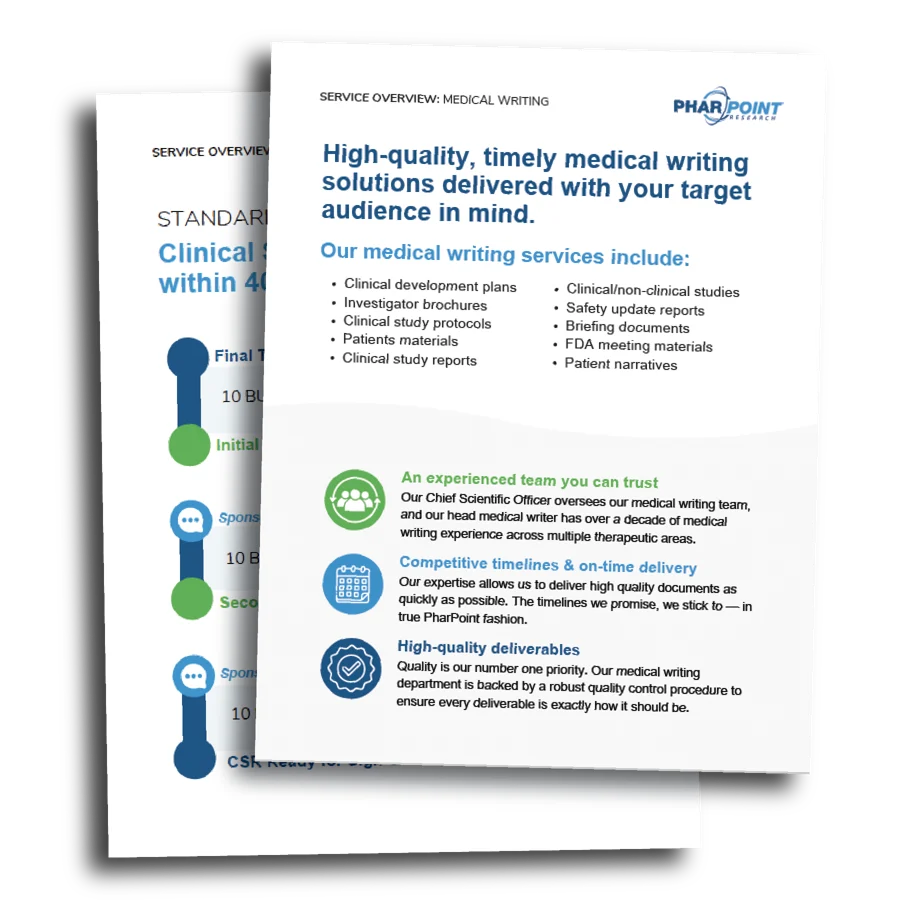Exploring the Characteristics of a High-Performing Medical Writing Vendor
Medical writing is often outsourced, with demand for professional medical writers rising dramatically as the biopharmaceutical industry grows. (Source – Biospace)
There are multiple options for Sponsors looking to outsource this service, including working with niche medical writing companies, freelance medical writers, and medical writing teams within contract research organizations (CROs).
Regardless of whom a Sponsor works with, thoroughly evaluating quality and timeliness is critical to receiving a successful deliverable from outsourced teams.
How can Sponsors confidently choose the best medical writing vendor for their needs? What are the characteristics of a high-quality medical writing team?
We spoke to PharPoint’s associate director of medical writing, Samia K. Samia has over ten years of experience in medical writing and received her Pharmacy degree in 2001. At PharPoint, she helps clients prepare and develop various regulatory documents, including protocols, investigator brochures, and clinical study reports.
Time Management & A Systematic Approach
It’s easy to get caught up in the chaos of the many moving parts and deliverables a trial requires, and if you’re outsourcing your medical writing, the vendor you select should be able to help bring a sense of calm, attentive organization to that piece of your project.
An organized and systematic process helps medical writers deliver complex scientific information in a clear, concise manner. These processes should also allow them to help set sponsor expectations and ensure that a sponsor is guided toward maximum efficiency.
“It’s just one less challenge when your medical writers are systematic,” Samia explains. “It creates a roadmap for interactions.”
A thorough, high-quality medical writing process should go beyond word processing. For an accurate timeline of deliverables, medical writers must also consider the time needed for upfront research, review periods, and quality control processes.
“A word processing job is very important, don’t get me wrong, but the other steps involved are very important, too,” Samia shares.
When your medical writer follows a structured approach, you can confidently anticipate that:
- all relevant information is included in deliverables;
- information is presented in a logical sequence in your deliverables; and
- deliverable timelines are met.
Communication and Experience
A talented medical writer should be communicative and experienced, with the proper insight to identify and convey the information they need to set and meet deliverable goals.
“I rely on others to deliver, and others rely on me to deliver,” Samia says. “I am clear with our client, my co-workers, and my team in what I will deliver, and what I need in order to deliver.”
Medical writers should be able to proactively identify and ask for the information needed to complete a task on-time, limiting later surprises that could impact deliverable timelines. Similarly, effective medical writing teams should prioritize clear ongoing communication, both regularly providing updates to and asking for updates from a Sponsor in order to clearly outline how any evolving factors could impact the timeline of delivery.
With the right experience, medical writers can also act as an extra eye to ensure all of your deliverables are correct, examining information to ensure accuracy and ensuring all your ducks are in a row.
Conclusion
With a process-driven, communicative, and insightful team, you can be confident in the success of a high-quality, on-time medical writing deliverable.
Looking to outsource your medical writing needs? Learn more about PharPoint’s medical writing services or contact us for more information.





